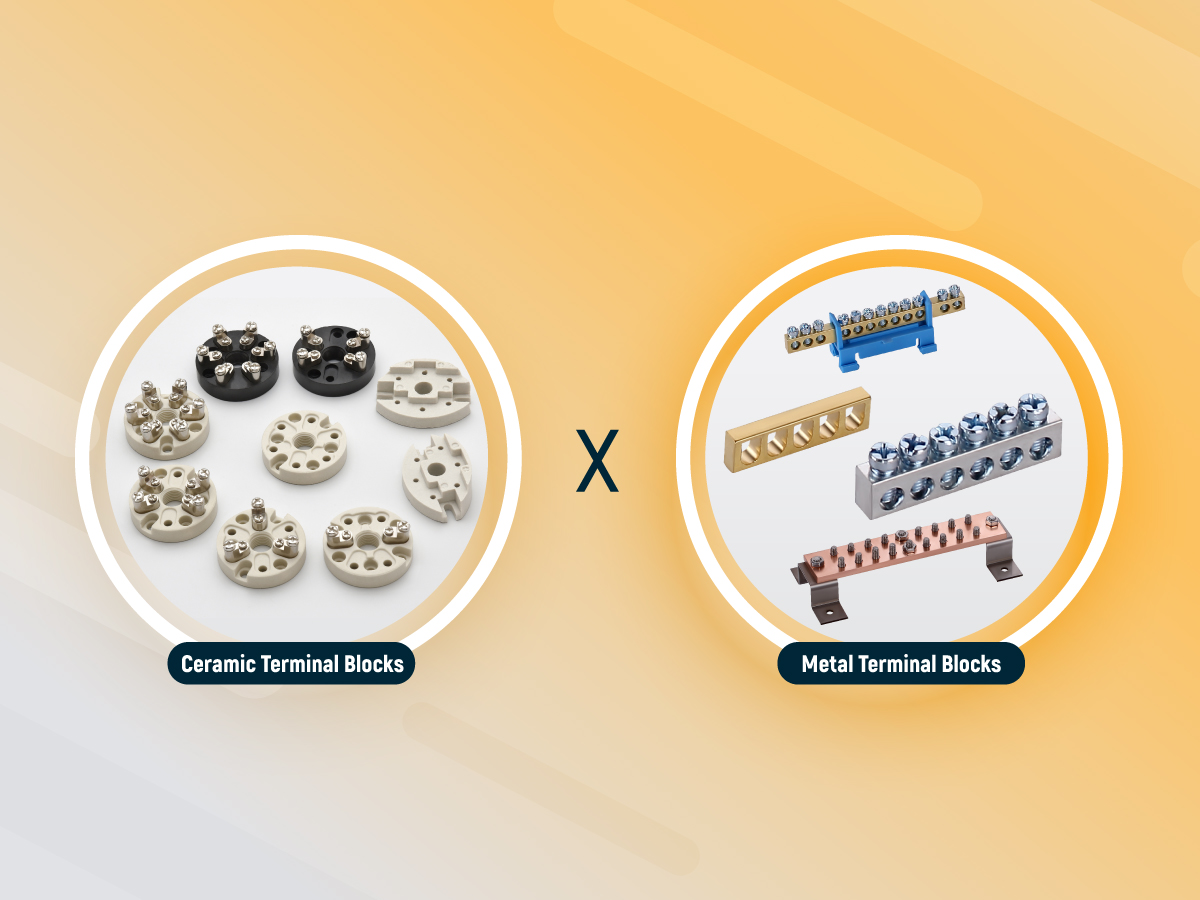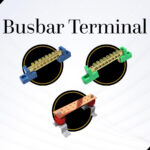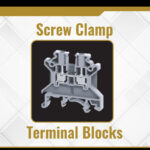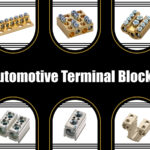What are the differences between ceramic terminal blocks and metal terminal blocks?

There are various types of terminal blocks that are utilized across a wide range of industrial applications. For optimal performance, you must use a suitable type of terminal block. An incorrect choice could compromise the functionality of your application or potentially lead to risks over time. The terminal block selection process will be more challenging when it comes to the material, style, and price! It is not just about how aesthetically pleasing the terminal block is, but also about its quality and durability.
When it comes to choosing terminal blocks for electrical connections, the type of material plays a significant role in determining their suitability for specific applications. At Teron Metal Components, we understand the importance of selecting the right components to enhance efficiency and reliability in electrical systems. Below, we explore the key differences between ceramic terminal blocks and metal terminal blocks to help you make informed decisions.
Ceramic Terminal Blocks
Ceramic terminal blocks are typically made from porcelain, and are essential electrical components used across various applications. Designed to provide safe and reliable connections, they feature two or more terminals secured with screws or similar fastening mechanisms. These blocks are ideal for power distribution, equipment control, and connecting multiple circuits, available in two-way, three-way, or four-way configurations. Known for their excellent heat resistance, superior insulation, and vibration resistance, ceramic terminal blocks are well-suited for high-temperature environments and demanding conditions.
Advantages of Ceramic terminal blocks
- Temperature resistance: Ceramic terminal blocks are engineered to endure exceptionally high temperatures, often reaching several hundred degrees Celsius, depending on the specific type of ceramic material utilized.
- Electrical insulation: Ceramic materials possess exceptional electrical insulation properties, making them ideal for high-voltage applications.
- Corrosion Resistance: Ceramic materials are highly resistant to corrosion, making these terminal blocks well-suited for use in harsh environments.
- Thermal conductivity: These ceramic terminal blocks are engineered with tailored thermal conductivity properties to ensure effective heat transfer or dissipation in high-temperature applications.
- Customization: Ceramic terminal blocks can be customized to suit specific application needs, including various pin configurations, sizes, and shapes, ensuring compatibility with the intended electrical system.
Metal terminal blocks
Metal terminal blocks are primarily made from brass (an alloy of copper and zinc). However, other materials such as pure copper, beryllium copper, phosphor bronze, and aluminum are also available as alternatives. The metal terminal blocks are robust electrical components designed to securely connect multiple wires by providing a solid metal platform with screw clamps. It ensures safe, organized electrical connections and is widely used in industrial applications. Known for its durability, high current-carrying capacity, and ability to accommodate heavier gauge wires, a metal terminal block is ideal for demanding environments, offering superior performance compared to plastic alternatives.
Advantages of Metal terminal blocks
- High current capacity: Metal, particularly brass, is an excellent conductor of electricity, enabling metal terminal blocks to manage high current flows with minimal voltage drop.
- Durability and longevity: Metal construction offers durability against mechanical stress and vibration, ensuring reliable performance in challenging environments.
- Corrosion resistance: With appropriate treatment, metal terminal blocks can resist corrosion, making them ideal for applications exposed to moisture or chemicals.
- Flexibility in configuration: Metal terminal blocks are available in a range of sizes and configurations to support various wire gauges and circuit designs.
Comparison between Ceramic terminal blocks and Metal terminal blocks:
| Ceramic terminal blocks | Metal terminal blocks |
|---|---|
| Ceramic terminal blocks are made from ceramic material like porcelain. | Metal terminal blocks are made from metal like brass or copper. |
| Ideal for high temperature applications. | Generally used for moderate to low temperature applications. |
| Can handle up to 400℃. | Can handle up to 100℃ to 160℃. |
| They are electrically insulated. | They are not the best at providing insulation. |
| They are a little bit difficult to manufacture because of processes like molding and firing. | Easy to manufacture because metal can be radially machined and formed into desired shapes. |
| Ceramic terminal blocks are more expensive. | Metal terminal blocks are less expensive than ceramic terminal blocks. |
In conclusion, both metal and ceramic terminal blocks offer unique advantages depending on the application. In terms of general utility, metal terminal blocks are mostly considered, and suitable for general applications. There are many advantages and differences between ceramic terminal blocks and metal terminal blocks, so it’s important to understand their properties, advantages, and differences before planning. The extensive information will help you to identify which option is best suited for specific applications.
If you are looking for bulk production of standard or custom terminal blocks, Teron Metal Components is a high-quality terminal block manufacturer and exporter you can trust. No matter whether your requirement is low, medium, or high-volume, or if you are looking for a contract or OEM manufacturing of terminal blocks, request a free quote or contact us via email at sales@teronmetalcomponents.com. We are happy to hear from you!



